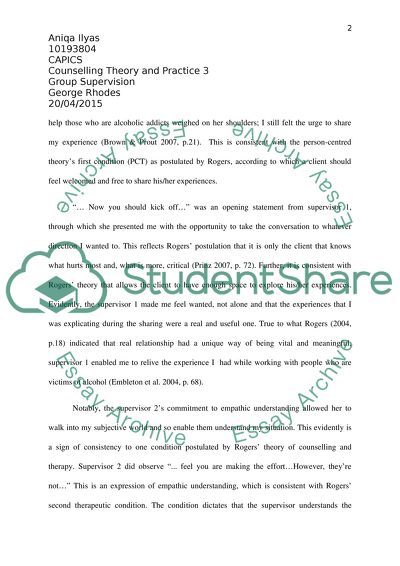Cite this document
(“Analyse one of your group supervision sessions from the person centred Essay”, n.d.)
Analyse one of your group supervision sessions from the person centred Essay. Retrieved from https://studentshare.org/miscellaneous/1681498-analyse-one-of-your-group-supervision-sessions-from-the-person-centred-perspective-identify-key-moments-and-reflect-on-how-they-impact-upon-your-personal-and-professional-development-demonstrate-your-understanding-and-integration-of-person-centred-theor
Analyse one of your group supervision sessions from the person centred Essay. Retrieved from https://studentshare.org/miscellaneous/1681498-analyse-one-of-your-group-supervision-sessions-from-the-person-centred-perspective-identify-key-moments-and-reflect-on-how-they-impact-upon-your-personal-and-professional-development-demonstrate-your-understanding-and-integration-of-person-centred-theor
(Analyse One of Your Group Supervision Sessions from the Person Centred Essay)
Analyse One of Your Group Supervision Sessions from the Person Centred Essay. https://studentshare.org/miscellaneous/1681498-analyse-one-of-your-group-supervision-sessions-from-the-person-centred-perspective-identify-key-moments-and-reflect-on-how-they-impact-upon-your-personal-and-professional-development-demonstrate-your-understanding-and-integration-of-person-centred-theor.
Analyse One of Your Group Supervision Sessions from the Person Centred Essay. https://studentshare.org/miscellaneous/1681498-analyse-one-of-your-group-supervision-sessions-from-the-person-centred-perspective-identify-key-moments-and-reflect-on-how-they-impact-upon-your-personal-and-professional-development-demonstrate-your-understanding-and-integration-of-person-centred-theor.
“Analyse One of Your Group Supervision Sessions from the Person Centred Essay”, n.d. https://studentshare.org/miscellaneous/1681498-analyse-one-of-your-group-supervision-sessions-from-the-person-centred-perspective-identify-key-moments-and-reflect-on-how-they-impact-upon-your-personal-and-professional-development-demonstrate-your-understanding-and-integration-of-person-centred-theor.


